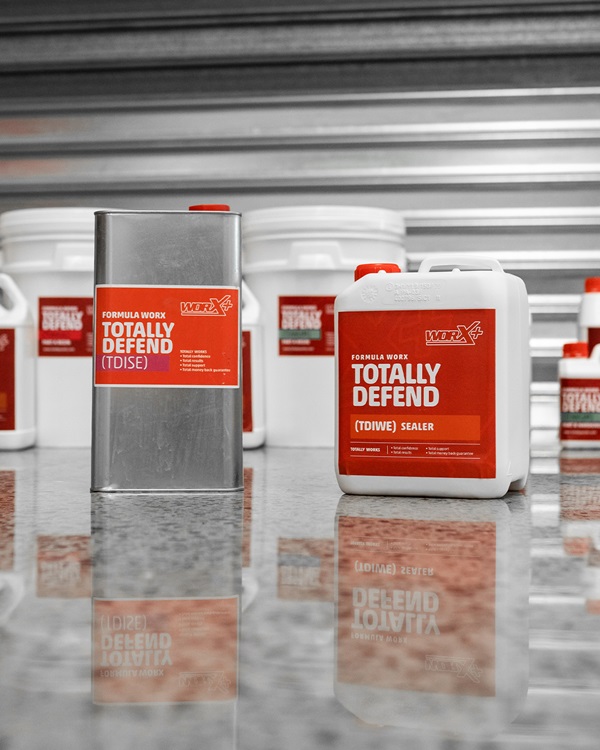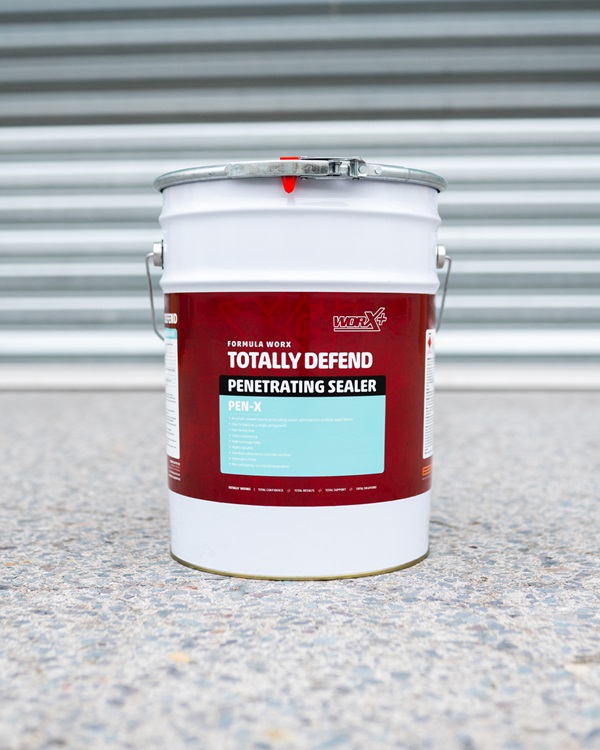Demystifying the "Magic Sealer": The Reality of Sealer Selection for Concrete
This article is based on an episode of the WORX+ TechTalk series. You can watch the full episode here.
A sealer is a liquid chemical treatment applied to concrete surfaces to protect them from damage, enhance their appearance, and improve their performance. They’re the final step in your concrete polish. It’s therefore no surprise that choosing the right sealer is crucial to a job well done.
However, as much as we wish there was, there is no single, miracle sealer that can be used for every polished concrete project. In this article, we’re going to dispel this “magic sealer” myth and equip you with the knowledge of how to select the best sealer for each project and get the best out of your floor.
THREE TYPES
Sealers fall into three categories based on the degree of their topical nature (how much of a coating they leave on the surface of the concrete). We’ll be discussing sealers from the least topical (impregnating sealers) to the most (topical sealers) and their benefits and drawbacks. So, let’s get started.
IMPREGNATING SEALERS
|
Impregnating sealers are unique as they don’t form a physical barrier between the concrete and its environment. These sealers work by penetrating the concrete and chemically reacting within its structure to form a barrier against liquids and stains. This chemical reaction means the sealer becomes a durable part of the concrete’s structure and provides long-lasting protection.
|
 |
Let’s have a look at how this works:
Penetration and Reaction:
- Impregnating sealers are designed to penetrate the concrete's pores and capillaries rather than simply sitting on the surface
- They chemically react with the concrete's components, typically calcium hydroxide, to form a water-repellent barrier within the concrete matrix.
Negative Charge Barrier:
- The chemical reaction between the sealers and the concrete’s components creates a negative charge within the concrete that repels liquids, preventing them from being absorbed and causing stains or damage.
- The sealer becomes an integral part of the concrete, rather than forming a separate layer on top.
Benefits
- Invisibility: as you can’t see this sealer, it doesn’t significantly alter the concrete's natural appearance (except some possible colour enhancement) and preserves the natural aesthetic of polished concrete.
- Breathability: Because there is no coating on the top of the concrete, this sealant doesn’t trap moisture in the concrete slab. This can prevent problems with discolouration, sealer failure and the reactivation of densifiers.
Disadvantages
- Cost: Impregnating sealers typically have a lower coverage rate per litre compared to penetrating sealers, potentially leading to higher overall costs, especially for large projects.
PENETRATING SEALERS
|
Penetrating sealers occupy a middle ground between impregnating sealers and topical sealers and offer a balance of protection and appearance enhancement.
If you want to enhance the gloss and colour of your concrete without significantly altering its natural appearance, a penetrating sealer might be a good option for your project.
|
 |
Like the WORX+ Totally Defend PEN-X, penetrating sealers are acrylic-based products known for:
- UV resistance
- Water repellence
- Relatively quick drying times
They operate a bit differently from impregnating sealers.
Let’s explore how:
Partial Penetration:
- Penetrating sealers go into the concrete's pores and capillaries, but not to the degree that impregnating sealer does.
Surface Film:
- They also leave a thin film on the surface of the concrete.
Benefits
- Protective Barrier: it defends against stains and moisture because of its thin film.
- Gloss and Colour Enhancement: the increased gloss level caused by the film can give the concrete a more polished appearance as well as deepening and enriching the colour of the concrete.
- Cost-Effectiveness: penetrating sealers often offer a good balance of performance and cost-effectiveness. They tend to have higher coverage rates (meaning you need less product per square meter) than impregnating sealers and are generally less expensive than topical sealers like polyurethanes or epoxies.
Disadvantages
- If you’re using finer diamond grits for a high-gloss finish, this sealer is not suitable.
Here’s why:
- Impaired Penetration: penetrating sealer is suitable for a range of concrete surfaces (like those with a honed or lightly polished finish), but if you’re using finer diamond grits for a high-gloss finish, this sealer is not suitable. This is because he sealer may not penetrate as effectively into very dense, highly polished concrete, leading to uneven application and reduced performance.
- Aesthetic Issues: the thin film may obscure the finish of your concrete.
- Reduced Protection: on highly polished surfaces, penetrating sealant is also more susceptible to scratches and wear because the concrete surface is harder and denser than the film. This can compromise the longevity of the finish.
TOPICAL SEALERS
Topical sealers (also called coatings) are a distinct category of concrete sealers that form a visible layer or film on the surface of the concrete.
Unlike the other sealers we’ve covered, there are different types:
1. Epoxies are composed of two main components: a resin and a hardener. When mixed, they undergo a chemical reaction, creating a strong, durable, and chemically resistant material on top of the concrete.
- Known for their high durability, chemical resistance, and ability to create a hard, glossy finish.
- Don't penetrate or form much of a bond with the concrete.
- They’re a "high solids" product, meaning they leave a thicker film on the surface.
2. Polyurethanes offer good UV resistance, flexibility, and abrasion resistance.
- Also don't penetrate or form much of a bond with the concrete.
- They have “high solids” content, but less than epoxies, so they leave a less thick film on the concrete surface.
3. Acrylics: while some acrylic sealers can be penetrating, topical acrylic sealers also exist.
Benefits
There are a range of benefits to using topical sealers and their thicker, more robust film.
- Protection: They offer a higher degree of protection against stains, moisture, chemicals, and abrasion compared to impregnating or penetrating sealers.
- Aesthetics: They can provide a wide range of decorative finishes, including high-gloss, satin, and matte. They can also be pigmented to add colour to the concrete.
Disadvantages
- Artificial Aesthetics: The visible film of a topical sealer can significantly change the look and feel of the concrete. It may obscure its natural texture and colour variations, creating an artificial look.
- Potential Adhesion Issues: Due to their limited penetration, topical sealers (specifically epoxies and polyurethanes) rely heavily on surface adhesion. Proper surface preparation is crucial to prevent bubbling, delamination, or peeling of the sealer over time.
- Higher Cost: Topical sealers tend to be more expensive than impregnating or penetrating sealers.
- Maintenance: Topical sealers may require more frequent maintenance and reapplication compared to impregnating sealers that become part of the concrete structure.
KEY TAKEAWAYS
We hope you’ve gained insight into the differences between the three types of sealer.
Here’s a quick overview:
Impregnating Sealers
- Provide a highly effective and invisible way to protect polished concrete surfaces.
- Ideal for preserving the beauty and performance of polished concrete floors.
- Expensive.
Penetrating Sealers
- Provide a middle ground between impregnating and topical sealers.
- Offer a balance of protection, appearance enhancement, and affordability.
- Not suitable for all situations for high gloss polished concrete surfaces.
Topical Sealers
- Offer a higher level of protection and decorative options.
- Produce an artificial look which can detract from the concrete.
- Inexpensive
- Potential adhesion issues.
These differences mean it’s important to choose the right sealer based on the specific project's aesthetic, performance, and budget requirements. Part of our mission here at WORX+ is to help you feel totally confident in your concrete grinding and polishing results. Our team are the best in the business, so let us help you find a method that totally WORX - give us a call on 1300 897 873.
Hang on, we’ve got more for you!
You can also check out our other TechTalk articles below, where we address common issues contractors face and the nitty gritty of the concrete grinding and polishing industry.
WordsCharactersReading time
WordsCharactersReading time
WordsCharactersReading time